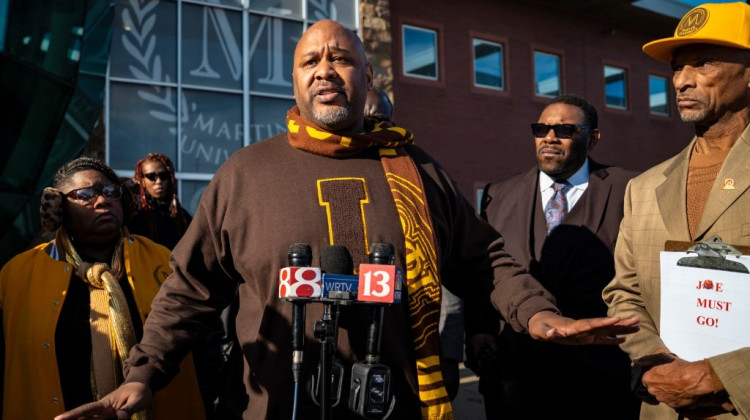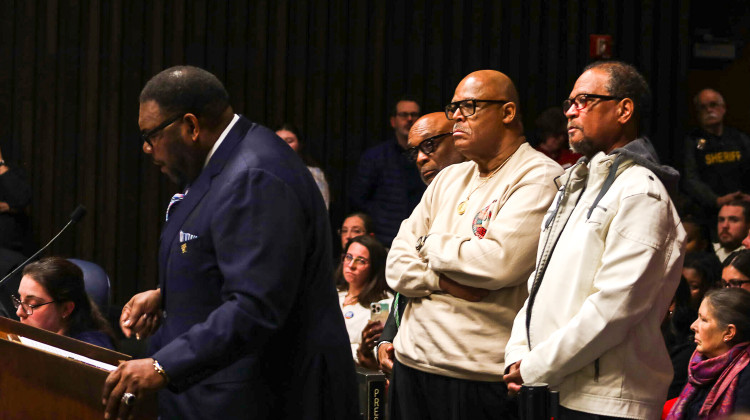
Tommy Reddicks, the CEO of Paramount Schools, stands outside of the Cottage Home location on Monday Nov. 13, 2022 in Indianapolis. It's one of three physical schools he operates in the city. Reddicks is preparing to open schools in Lafayette and South Bend.
Elizabeth Gabriel / WFYIParamount Schools of Excellence recently received a surprise $3 million donation, which will help the organization open two new schools next fall in South Bend and Lafayette. The financial gift, the largest received by the Indianapolis-based public charter school network, is from billionaire philanthropist MacKenzie Scott.
In the past week, other schools across the country have announced massive donations from Scott, including $25 million to Chicago Public Schools and $18 million to Durham Public Schools in North Carolina.
The Paramount Schools network currently serves roughly 1,500 students in multiple Indianapolis neighborhoods – Brookside, Englewood and Cottage Home, as well as an online academy in partnership with the Indianapolis Public Schools district.
For years, Indianapolis has struggled to get students up to grade level standards. In 2022, only three out of the 11 Marion County school districts had students pass both the math and English Language Arts portions of the ILEARN state standardized test. Those scores were even lower for students who identify as Black, Hispanic, an English Language Learner or someone receiving special education services.
Paramount Schools, which serves at least 50 percent Black and at least 15 percent Hispanic students at its three brick-and-mortar schools, produced some of the highest standardized test scores in the state while also closing its achievement gap. That means Black and Hispanic students’ academic performance is just as high as their White classmates.
Last week, IPS Superintendent Aleesia Johnson and school board members said they are open to collaborating on a new school with Paramount. Families and local organizations have been pushing the district to help the network expand.
WFYI’s Elizabeth Gabriel talked to Paramount Schools CEO Tommy Reddicks to learn how his schools have boosted the academic performance for students of color. This interview has been condensed and edited for clarity.
Elizabeth Gabriel: Over the past decade, Paramount has expanded to three school buildings, an online academy and more than tripled its student population. What is your school model?
Tommy Reddicks: We don't have a distinct model at Paramount. What we really focus on is, how do we work with our students to achieve Indiana's academic standards. So looking at what we do as a school, it's kind of an old school approach to hard work and a strong work ethic tied to data. Though one thing I would say that's different about our school model is it's about students doing the work. So if you walked into any of our classrooms, you'll see a teacher teaching for five to 10 minutes, and then releasing that teaching to student work. And then that teacher will walk around and aid in the student work like a great coach, but the students will be doing the work for the majority of the classroom time. So if you walk into our classrooms, often they look really boring, because there's no inspirational teacher giving this great long speech. There's heads down and work going on and a teacher quietly working with individual students as they need a push or a little bit of help.
Gabriel: That's really interesting, that sounds like a cool model. I've heard that some of your schools have animals on-site. Which schools have goats and chickens and how does that help students learn?
Reddicks: We're big fans of urban farming. I myself – growing up in rural Texas as a young kid – we had goats, we had chickens, we had a garden, we canned vegetables. So going through those experiences growing up really helped me create a love and passion for that kind of work. And what we find with our high rigor approach in our schools is that if we don't balance all that classroom work with something experiential and fun, then everybody's going to burn out. And so we like to scaffold our environment for excitement. So you've got a time for rigor and a time for excitement and that balance keeps everybody happy and wanting to come back. Urban farms provide a great level of excitement, especially because it's not something that's just readily available to our youth. And when you can provide them that kind of extra joy and extra excitement that you wouldn't necessarily find anywhere else, it really kind of catapults the system and keeps the energy driving forward.
So two of our campuses, Paramount Brookside and Paramount Cottage Home, have urban farms. At the Brookside farm we have a resident goat herd, we have chickens, we have bees. We've got a large garden and a greenhouse, and we milk our goats and we make our own cheese. We're a certified dairy in the state of Indiana, the smallest dairy in Indiana. We're approved by the Board of Animal Health to produce a cheese product, which we're pretty excited about and we sell that cheese locally through restaurants and through grocery stores. Our Paramount Cottage Home campus also has a resident goat herd, and a cheese making facility and it also has a large garden. And so this campus at Paramount Cottage Home is relatively new. And so we're still building up the capacity of that farm, but still able to do a lot of the same things that the Brookside campus does, and now there's talk about our Paramount Englewood campus also incorporating an urban farm, and so we're excited about those opportunities.
Gabriel: Philanthropist MacKenzie Scott has pledged to give away most of her billions in wealth to charity. She will give Paramount more than $3 million to build two more schools. How do you all specifically plan to use this money to support students and teachers?
Reddicks: Well, first off, our organization is completely humbled by the gift. It was overwhelming, to say the least, to hear that a national figure like MacKenzie Scott was taking an interest in the work that we were doing and it was willing to provide such a large gift to our organization. We want to be really good stewards of that income, and honor that donation and to continue the passion and the work and the success that we already have. We were in a position in expansion to South Bend and Lafayette, Indiana, of really doing a lot to subsidize the startup of those schools with our own organizational income, and that was going to make things fairly tight. We know that this donation of $3 million is going to go a long way to helping us fund those startups in a way that keeps our cash position strong.
We're going to put it directly towards the cost of expansion in our two new markets. In South Bend our cost to renovate the building that we were given by the South Bend Schools Community Corporation, that was going to be $3.2 million just to renovate that one site. The cost to renovate our site in Lafayette was over $1 million. So already there's $4 million in, you know, committed cash from our organization that, like I said, would have had us at a tight point, and perhaps even a risky point during expansion. And this income removes that risk and allows us to operate with more general fund flexibility.
Gabriel: Your schools have consistently outperformed those in Indianapolis on standardized tests. Why have you decided to open schools in South Bend and Lafayette when students of color in Indy still have low state test scores?
Reddicks: Such a good question.We're dedicated to every student we serve. And we've expanded in the Indianapolis area by, like you mentioned before, tripling our presence – almost quadrupling because we now have four schools in the Indy area if you count our online academy. But what we're finding in the Indianapolis area [is] that if you're going to open another school, you're probably putting an adjacent school out of business. The market’s become very saturated in terms of having more seats than available children, and we had to question our role in terms of being responsible stewards in the community. Is our role to put other schools out of business, or is our role to serve kids well? Obviously, we side on option B there – we don't want to put other schools out of business. And so we wanted to look at how can we expand our quest for offering more high quality seats to kids without causing harm in the current market. And that's what led us to look outside of Indianapolis and explore other areas.
And we haven't given up on offering more seats in Indianapolis. We are going to open another school. It's going to be a K-8 girls school focused on STEM in 2024 in the Indianapolis area. And we're not going to say that's it. But that's it for now because it's expensive to expand and we need to make sure that we're doing well by that and our schools are performing at a high level before we consider additional seats.
Gabriel: Our time is almost up, but is there anything else you would like to add before we go?
Reddicks: I can just say that I'm really excited about the momentum that we have. We have 12 years now of success, including a National Blue Ribbon [and] a National Green Ribbon. We've been an A school corporation for years and years and years.
I think that there's been some myths out there about charter schools and we’re widely misunderstood. A lot of people think Paramount Schools are private schools, and that's not the case. We're free public schools. There's a lot of people in the community that think charter schools aren't accessible – that they're private, or they cost money or they're selective. And we're none of those things. In fact, if we have an open seat and any parent walks in and says, ‘I want that open seat for my child,’ we have to give that seat to that parent, and we want to. We want to serve all kids at any level and any ability, and we're confident in our ability to grow them. But really, we're trying to break through that stereotype that we're individualized and not for every parent. I think we're proving over and over again that we can be a great educational solution for any parent.
Gabriel: Thank you for joining me, Tommy. I appreciate you chatting with me.
Reddicks: Absolutely, thank you.
Contact WFYI education reporter Elizabeth Gabriel at egabriel@wfyi.org. Follow on Twitter: @_elizabethgabs.
 DONATE
DONATE







 Support WFYI. We can't do it without you.
Support WFYI. We can't do it without you.